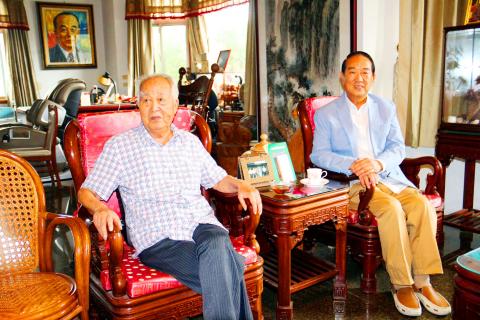Former vice president Lee Yuan-tsu (李元簇) died at the age of 94 in the early hours of yesterday morning at his home in Chiayi County’s Toufen City (頭份) after developing kidney disease.
Lee, who was known as “the silent vice president,” served under former president Lee Teng-hui (李登輝) from 1990 to 1996, after which he retired to Chiayi.
Lee Yuan-tsu was nominated vice president by Lee Teng-hui in the wake of political conflict within the Chinese Nationalist Party (KMT), which began after former president Chiang Ching-kuo (蔣經國) died without appointing a successor on Jan. 13, 1988.

Photo: CNA
Known as the February Political Struggle, the conflict divided the KMT into two camps: The so-called “mainstream faction” led by Lee Teng-hui that was perceived to be pro-reform, and the “non-mainstream faction” that was comprised of his opponents.
In 1989 Lee Teng-hui said his vice president must be a waishengren (外省人), a term referring to people who fled to Taiwan with the Chinese Nationalist Party (KMT) in 1949; an outsider to the KMT’s inner circle; have no presidential ambitions and have a reputation for being circumspect and trustworthy.
Lee Yuan-tsu was considered a favorable nominee because of his expertise in jurisprudence, which Lee Teng-hui considered indispensable to his constitutional and legal reforms.
Lee Yuan-tsu was elected vice president by the National Assembly on March 21, 1990, becoming the last waishengren to hold that office and the last vice president elected by the National Assembly.
During his tenure, Lee Yuan-tsu was known for his laconic and restrained public style.
“A good vice president is a silent vice president” Lee Teng-hui reportedly once said of Lee Yuan-tsu.
After retiring in 1996, Lee Yuan-tsu resumed teaching at National Chengchi University. Following his wife’s death in 1998, he lived alone.
President Tsai Ing-wen (蔡英文) offered her condolences to Lee Yuan-tsu’s family and her support for his funeral arrangements.
“The Executive Yuan is deeply saddened at the passing of former vice president Lee Yuan-tsu,” Executive Yuan spokesperson Hsu Kuo-yung (徐國勇) said on Facebook.
Lee Yuan-tsu died of renal failure and had issued a “no resuscitation order,” former charge d’affaires at Lee Yuan-tsu’s official residence Chen Chin-ting (陳進丁) said.
Additional reporting by CNA

Taiwan has received more than US$70 million in royalties as of the end of last year from developing the F-16V jet as countries worldwide purchase or upgrade to this popular model, government and military officials said on Saturday. Taiwan funded the development of the F-16V jet and ended up the sole investor as other countries withdrew from the program. Now the F-16V is increasingly popular and countries must pay Taiwan a percentage in royalties when they purchase new F-16V aircraft or upgrade older F-16 models. The next five years are expected to be the peak for these royalties, with Taiwan potentially earning

STAY IN YOUR LANE: As the US and Israel attack Iran, the ministry has warned China not to overstep by including Taiwanese citizens in its evacuation orders The Ministry of Foreign Affairs (MOFA) yesterday rebuked a statement by China’s embassy in Israel that it would evacuate Taiwanese holders of Chinese travel documents from Israel amid the latter’s escalating conflict with Iran. Tensions have risen across the Middle East in the wake of US and Israeli airstrikes on Iran beginning Saturday. China subsequently issued an evacuation notice for its citizens. In a news release, the Chinese embassy in Israel said holders of “Taiwan compatriot permits (台胞證)” issued to Taiwanese nationals by Chinese authorities for travel to China — could register for evacuation to Egypt. In Taipei, the ministry yesterday said Taiwan

Taiwan is awaiting official notification from the US regarding the status of the Agreement on Reciprocal Trade (ART) after the US Supreme Court ruled US President Donald Trump's global tariffs unconstitutional. Speaking to reporters before a legislative hearing today, Premier Cho Jung-tai (卓榮泰) said that Taiwan's negotiation team remains focused on ensuring that the bilateral trade deal remains intact despite the legal challenge to Trump's tariff policy. "The US has pledged to notify its trade partners once the subsequent administrative and legal processes are finalized, and that certainly includes Taiwan," Cho said when asked about opposition parties’ doubts that the ART was

If China chose to invade Taiwan tomorrow, it would only have to sever three undersea fiber-optic cable clusters to cause a data blackout, Jason Hsu (許毓仁), a senior fellow at the Hudson Institute and former Chinese Nationalist Party (KMT) legislator, told a US security panel yesterday. In a Taiwan contingency, cable disruption would be one of the earliest preinvasion actions and the signal that escalation had begun, he said, adding that Taiwan’s current cable repair capabilities are insufficient. The US-China Economic and Security Review Commission (USCC) yesterday held a hearing on US-China Competition Under the Sea, with Hsu speaking on